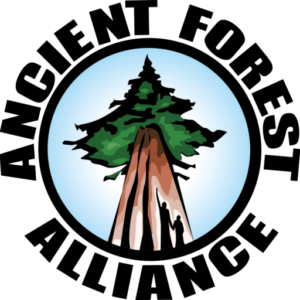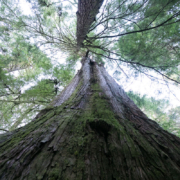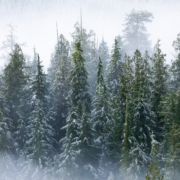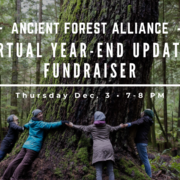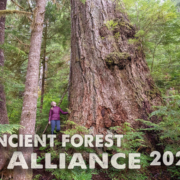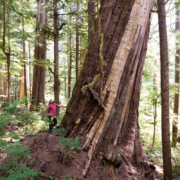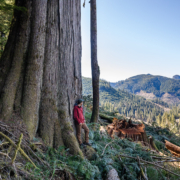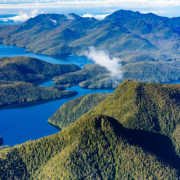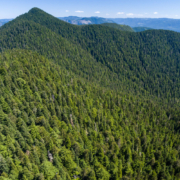Union of BC Indian Chiefs (UBCIC) and conservation groups call for critical funding for First Nations old-growth protection initiatives- Joint letter
The Union of BC Indian Chiefs (UBCIC) and conservation groups including Ancient Forest Alliance, Endangered Ecosystems Alliance, Sierra Club of BC, Wilderness Committee, and Stand.earth have sent a joint letter to the BC government calling for financing to support First Nations old-growth protection initiatives. Read the full letter below:
February 24, 2021
Request for Provincial Funding in Developing a Provincial Old-Growth Strategy
To the Honourable:
Premier John Horgan
Minister of Indigenous Relations and Reconciliation Murray Rankin
Minister of Finance Selina Robinson
Minister of Forests Katrine Conroy
Minister of Environment and Climate Change Strategy George Heyman
Minister of State for Lands and Natural Resource Operations Nathan Cullen
Minister of Municipal Affairs Josie Osborne
We, the undersigned First Nations and conservation organizations, are calling on your government to provide the critical funding needed to fulfill your obligations to Indigenous peoples and incur the necessary changes to BC’s system of forest management as you develop a new policy framework in consultation with First Nations to manage and protect old-growth forests in BC.
We are pleased that the BC government has committed to implementing all 14 recommendations of the Old-Growth Strategic Review Panel. However, the province has not yet committed to a critical component that would enable this to happen – the requisite funding.
The implementation across the province of the Panel’s immediate-term recommendations for logging deferrals in the most endangered, productive (ie. grandest), oldest, and most intact old-growth forest types, and for the longer-term protection of these and other old-growth forests, cannot be achieved without sufficient funding in a number of areas.
Financial resources for First Nations, including hereditary Title and Rights holders, are needed to implement these deferrals in their territories to forgo the associated revenues to their communities, and to fund Indigenous land use planning, community engagement, management, and stewardship (through initiatives like Indigenous Guardians programs) that are vital to the establishment of Indigenous Protected and Conserved Areas to protect old-growth forests for future generations.
In addition, conservation financing is vital to support and advance sustainable economic self-determination in First Nations communities to ensure that an equivalent economic alternative to old-growth logging is available for these communities. The financing is needed to assist the development of First Nations businesses in cultural and eco-tourism, clean energy, value-added second-growth forestry, sustainable seafood, and non-timber forest products congruent with old-growth forest protection.
The current landscape of old-growth logging has been exacerbated over years by successive BC governments working to commercialize all old growth timber and foster an economic dependence on old-growth logging in First Nations communities. They have achieved this by arranging agreements for revenue-sharing, employment, joint ventures, and tenures for old growth timber in contentious areas for First Nations, who face limited economic opportunities as a result of years of colonialism and racism.
With a lack of critical and accessible funding, combined with the government’s overwhelming influence resulting in Indigenous dependency on old-growth logging jobs and revenues, First Nations communities are unable to exercise their Title and Rights to freely pursue other economic options consistent with the protection of old-growth forests and Indigenous self-determination. Therefore, consultations conducted by the provincial government without the requisite funding for sustainable economic alternatives maintains the status quo of old-growth logging while removing Indigenous self-determination, decision making and well-being in conservation and stewardship.
For private lands, an annual, dedicated land acquisition fund is needed to earmark and purchase old-growth forests and endangered ecosystems on private lands as new protected areas, including Indigenous Protected Areas. This must be done in consultation with the First Nations whose territory the land is on.
Provincial funding to protect old-growth forests can be augmented by funding from the federal government and conservation organizations. We urge the Province to turn to examples like the Great Bear Rainforest Initiative where $120 million in funding – $60 million from conservation organizations, $30 million from the federal government, and $30 million from the province – helped Indigenous communities develop new businesses and undertake stewardship and restoration programs associated with protecting a third of the Central and North Coasts of BC.
Carbon offsets from the province, businesses and other governments could be a key mechanism to help finance Indigenous protection of old-growth forests, as has been done in the Great Bear Rainforest and the Cheakamus Community Forest of the Lil’Wat and Squamish Nations.
Old-growth forests in British Columbia are keystone ecosystems that support wildlife and endangered species; clean water for communities and wild salmon; the cultural practices, spirituality, livelihoods, and local economies of First Nations; tourism and recreation industries for thousands of British Columbians; and regional and global climate regulation.
First Nations hold Inherent Rights and Title to the unceded lands we occupy. Since time immemorial, First Nations have harvested and been in relationship with the plants and animals of the land and waters for food, medicines, utensils, trade, cultural and ceremonial purposes, including with the wild salmon that spawn in the clean waters provided by old-growth forests and the monumental old-growth red and yellow cedars harvested for dugout canoes, totem poles, long-houses, clothing and regalia. Thus, old-growth forests possess incalculable cultural value and significance for First Nations, the original keepers and stewards of the Land.
Over a century of industrial logging has decimated the vast majority of productive old-growth forests in BC. A recent scientific study found that across BC only 2.7% of the original high productivity old-growth forests with the largest trees and “classic” forest giants still remain.
Today, the large-scale industrial clearcutting of old-growth forests continues, with over 50,000 hectares of old-growth forests being logged every year in BC.
Second-growth forests now constitute the vast majority of productive forest lands in the province, and a sustainable, value-added forest industry can be readily sustained by these second-growth stands.
BC can sustain and even expand forestry employment levels while protecting old-growth forests if the province pro-actively works to increase the jobs to harvest volume ratio in the second-growth forest industry. This shift can be achieved by implementing key incentives (rebates and tax-relief for new investments, education and skills training, R&D, marketing) and regulations (greater restrictions on raw log exports, development of regional log sorts) with a focus on lower volume but more labour-intensive, higher-end products.
In summary, we are asking that the British Columbian government create and fund a Provincial Old-Growth Strategy that will align with the Declaration on the Rights of Indigenous Peoples Act, fulfill the government’s obligation to the United Nations Declaration on the Rights of Indigenous Peoples (UNDRIP), and uphold a strong framework of First Nations and stakeholder consultations.
Adequate funding must be provided by the province to this end, including funding for the creation of First Nations Indigenous Protected and Conserved Areas (IPCAs) and land use plans; for the management and stewardship of IPCAs; for the development of conservation-based businesses and economies as an alternative to logging endangered old-growth forests; and for the purchasing and protection of old-growth forests on private lands.
An estimation of costs will be forthcoming regarding the funding needed from the province and other sources to fully implement the 14 recommendations of the Old-Growth Strategic Review Panel through a valuation analysis of the key components needed to support and enable Indigenous old-growth forest protection.
Alongside the development of a new Provincial Old-growth Strategy, it is vital that the province implement a comprehensive system of incentives and regulations to ensure the transition to a value-added, sustainable second-growth forest industry that supports and enhances the employment prospects for the thousands of BC forest industry workers.
Thank you for your time and consideration.
Sincerely,
On behalf of the Union of BC Indian Chiefs
Grand Chief Stewart Phillip, President
Chief Don Tom, Vice-President
Kukpi7 Judy Wilson, Secretary-Treasurer
Ken Wu, Executive Director, Endangered Ecosystems Alliance
TJ Watt, Executive Team, Ancient Forest Alliance
Hannah Askew, Executive Director, Sierra Club BC
Torrance Coste, National Campaign Director, Wilderness Committee
Tegan Hansen, Forest Campaigner, Stand.earth
View a PDF version of the letter here
